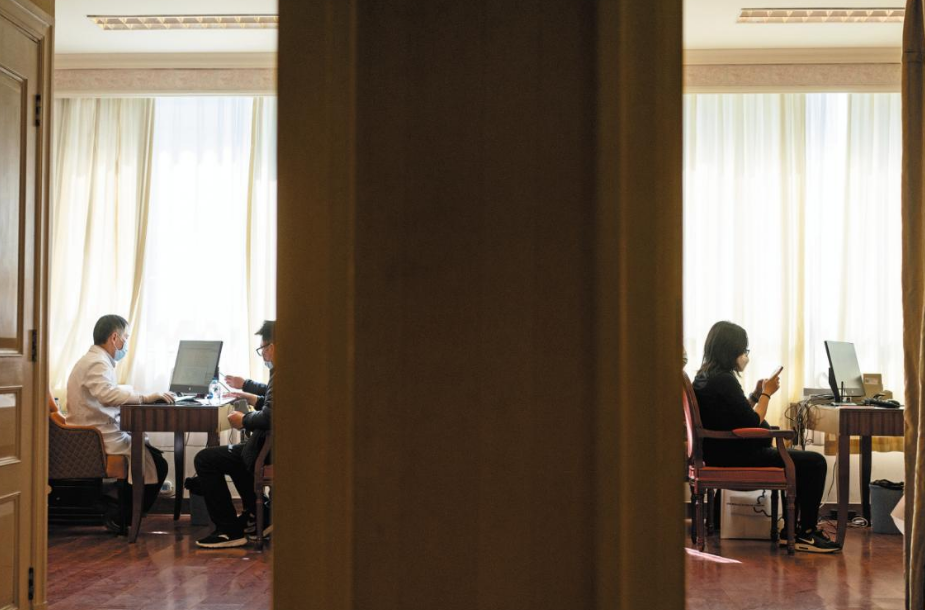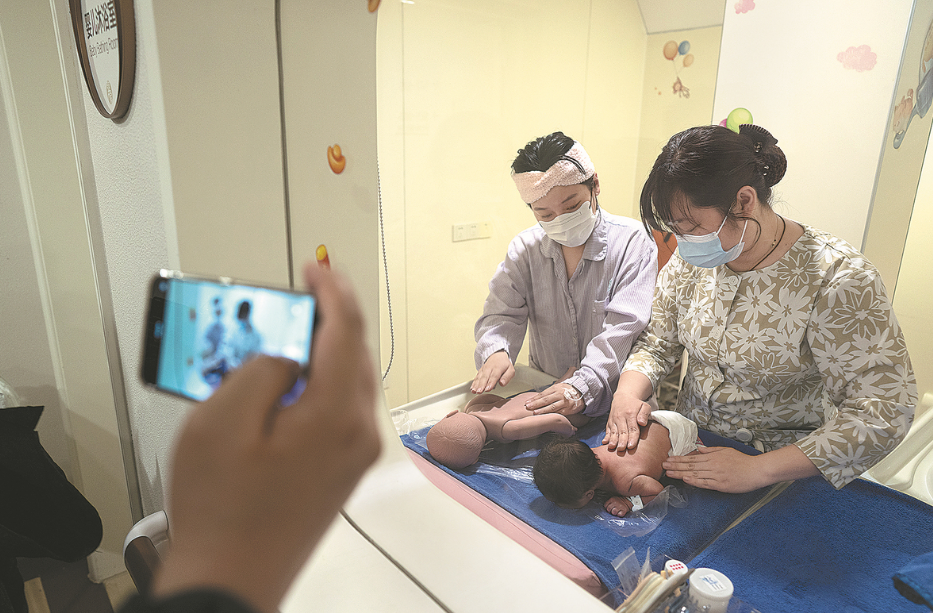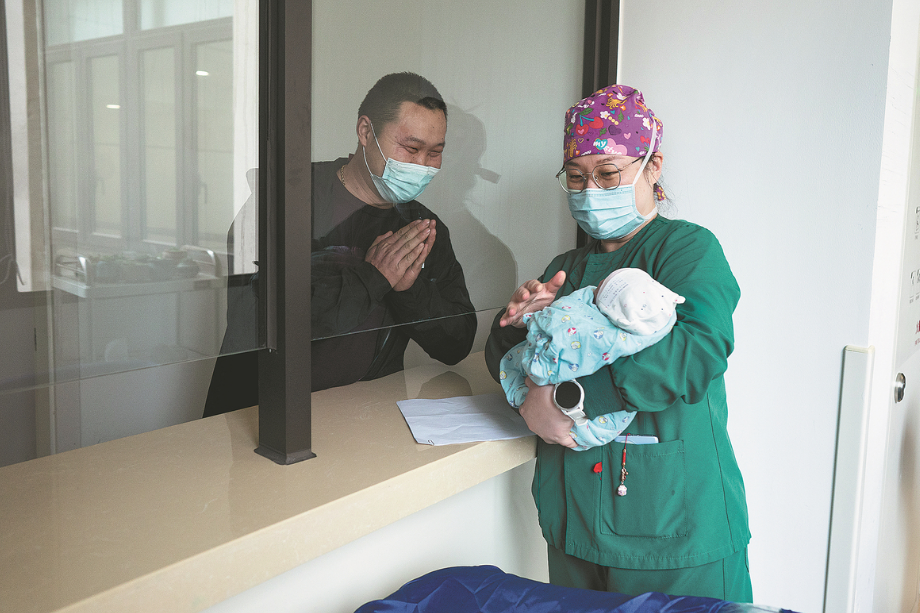
今日上海
需求高质量的产科服务 - 2023年04月03日
High-quality maternity services in demand

Doctors provide high-quality services at International Peace Maternity & Child Health Hospital of China in Shanghai.
Public hospitals offer VIP facilities for expectant mothers
Last summer, Tang Zhewen gave birth to her daughter in the VIP department at a public hospital in Shanghai.
The service provided at one of the city's most-respected maternity institutions — from antenatal checkups to delivery — cost her almost five times the average monthly salary in the city.
The per capita disposable income of Shanghai residents last year was 79,610 yuan ($11,567). Tang paid more than half this amount for the service she received.
She said many factors prompted her decision to use the hospital — such as her husband being allowed to take part in the entire checkup process, including ultrasonography.
The doctors at the unit also have more experience than those at other institutions, and after giving birth, Tang had a room to herself, rather than being accommodated in a ward of eight patients.
"I didn't consider the hospital's general maternity department, as it is so crowded, and pregnant women often wait a long time for an antenatal checkup," said Tang, 34, an administration worker at a State-owned enterprise.
"Pregnancy and childbirth are special stages in a woman's life, and perhaps once-in-a-lifetime experiences, so I wanted the best treatment I could get."
Although the number of births has fallen in Shanghai and nationwide in recent years, more women are opting for better services at major maternity hospitals in the city.
Tang gave birth in the welfare unit at International Peace Maternity & Child Health Hospital of China, or IPMCH. Nearly one-fifth of the 10,000 or so babies delivered at the hospital last year were born in the VIP unit.
At Shanghai First Maternity and Infant Hospital, high-quality maternity services now comprise 20 percent of such amenities provided by the institution.
Wang Yanlin, vice-president of IPMCH, said: "With development of the social economy and improved health awareness among the public, people have higher aspirations for a good life. The VIP unit, where services are constantly being upgraded, meets women's requirements for a more humanistic service, while providing quality medical treatment."
IPMCH was established in 1952 by Soong Ching Ling, the widow of Sun Yat-sen. It was the first maternity and child health hospital established in the nation since the founding of New China three years earlier.
At public hospitals across the country, only a limited number of places are available for women signing up at a general department for antenatal checkups and child delivery. The time each woman has with a doctor is also limited, and in most cases, spouses are excluded from many procedures.
Wang said the VIP unit at IPMCH was established jointly in 2002 with Johns Hopkins Hospital in the United States.
Clients were initially foreigners and some Chinese with medical insurance to cover much of the cost, but now, most of the clients are Chinese, and the number of beds has risen from 10 to 30, Wang said.
She added that maternity services failed to meet demand in most cases, although those signing up at the hospital's general department pay much less, and the cost is largely covered by public medical insurance.
Such demand drove the hospital to launch the VIP unit at its branch in suburban Fengxian district in July this year.
Zhou Ye, director of the unit, said: "We always limit the room occupancy rate to give new mothers a better experience. We used to keep it at 60 percent, but it has been pushed up to more than 70 percent, as the number of those signing up for the VIP service has risen significantly."
To maintain a quiet and comfortable environment, the hospital insists that no more than 70 percent of the rooms are occupied.
Sometimes there are lines of patients waiting for a checkup, Zhou said, and the institution is trying to improve the situation for patients by introducing digital payment and allocating reservation times more precisely.
She added that every expectant mother is assigned a doctor throughout pregnancy and delivery. Family members are allowed to accompany the patient throughout the process, and they can stay in the room after the baby is delivered.

Dummies are used at the hospital for instruction in caring for babies.
Multilevel needs
In July, Shanghai First Maternity and Infant Hospital launched Golden Key, a high-quality maternity service. The hospital had long provided a special clinic for mothers-to-be.
Ying Hao, vice-president of the hospital and director of the Shanghai Obstetrics Quality Control Center, said: "The new service was launched to meet multilevel needs from the public. Demand for the service was initially underestimated."
Huang Yiying, director of the hospital's obstetrics department, said more women in big cities are going to care centers after giving birth, and charges have risen over the years. Women now also have higher requirements for their level of comfort during childbirth, she said.
A maximum of 20 expectant mothers using the Golden Key service can receive antenatal checkups within half a day.
Huang said, "In many cases, I'm waiting for the patients, rather than them waiting for me."
A multidisciplinary team attends to an expectant mother during pregnancy and also arranges outpatient services, including nutrition, midwifery instruction, and breastfeeding, Huang added.
Liu Jinfeng, head obstetrics nurse at Shanghai First Maternity and Infant Hospital, said for example that at the midwifery clinic, pregnant women are given instruction and practice on how to breathe during labor.
She added that at the nutrition clinic, doctors learn in detail about each patient's dietary requirements, and help them plan what they eat and to control their weight, which will have a bearing on the baby's size and the smoothness of the delivery.
To raise questions at any time, mothers-to-be join a WeChat group, which also includes the doctor in charge, a nurse and midwife. A neonatologist joins the group after the birth.
Huang said: "We understand that expectant mothers can be anxious throughout pregnancy, and they have many questions to ask. If they have good communication with the medical team and receive prompt answers to their questions, they will develop a better sense of security.
"This will also help them during childbirth, which is an unprecedented experience clouded in uncertainties."
Tang said that during the antenatal checkups, she most looked forward to the ultrasound process, during which she and her husband watched the baby on screen. At general medical departments in public hospitals, other family members are not allowed to be present, and the screen is only viewed by the patient's doctor.
Liu said, "At Golden Key, we point at the screen to indicate the baby's head and feet to the parents-to-be. If they ask to watch the baby, this process can last half an hour."

A patient consults Yao Xiaqin, a senior doctor in the obstetrics department at Shanghai First Maternity and Infant Hospital.
Improvements made
Huang said that as a doctor, she used to view child delivery only from the medical perspective.
"For example, if a woman gave birth successfully after a prolonged delivery process, we'd say it was down to her own efforts, as we didn't use obstetric forceps or transfer her for a cesarean section. However, we neglected the woman's feelings, and this could be emotionally painful for her."
Improvements are being made. Labor analgesia — the reduction or management of pain during labor, which involves the use of anesthetic agents and/or an epidural — has been used for more than 90 percent of women giving birth naturally at the hospital, Huang said. The remainder either refuse the procedure or their health prevents them from undergoing it.
At Golden Key, midwives and nurses accompany patients throughout child delivery. They teach them to "push" in the right way and also offer constant encouragement, which many women said helps ease the pain and creates a more comfortable experience.
Huang said doctors are now paying more attention to checkups and delivery, for example, by offering words of encouragement to expectant mothers.
"Also, better pain management procedures will persuade more women who have doubts about childbirth to opt for natural deliveries," she said.
Liu said Golden Key allows fathers to cut the umbilical cord. Nurses also help the mother wear makeup in the delivery bed, and to take a family photo immediately after the birth.

A father greets his baby for the first time at Shanghai First Maternity and Infant Hospital.
Psychological support
Doctors said women opting for high-quality maternity services come from various age groups and backgrounds. However, a high proportion of them have complicated health conditions.
Xiao Wen, who experienced infertility for seven years before finally becoming pregnant last year after resorting to assisted reproductive technology for six months, signed up with the VIP unit at IPMCH.
"I went through a long and bitter experience physically and mentally before eventually giving birth, and I wanted to protect the baby with the best medical resources possible," she said.
Doctors said that compared with luxury private maternity hospitals, public hospitals have a better reputation for medical quality.
Wang, the IPMCH vice-president, said: "As a result, those at higher risk throughout pregnancy and delivery choose us. Also, it's not uncommon for a woman to decide on impulse to choose us in the middle of pregnancy if her health or that of the fetus suddenly changes.
"This is more evident nowadays, as the policy in China allows a couple to have three children, which has resulted in some older women deciding to become mothers again," she said.
Women with complicated and difficult health conditions usually request more humanistic care and mental support from doctors.
Huang said: "In some cases, women lose their first child just months after giving birth. In others, those who have been infertile for years, experience the death of their fetus. When encountering such patients, I spend a long time talking to them, as they have experienced extreme pressure."
She added that she is considering introducing psychological therapists to the service to ease the anxiety of expectant mothers, especially those who become pregnant after many failed attempts.
"Some women are unduly anxious about their unborn child. They think the baby is unhealthy if the fetus does not move often one day, and imagine that the baby is struggling if the fetus moves frequently the next day. We hope that psychological counselors can give them better guidance as a result of their professional experience," Huang said.
Wang said services at the IPMCH VIP unit will continue to be upgraded to create a better experience.
"For most women, giving birth is a first-time experience, which may influence their decision to have a second or third child. If we can offer each woman a better and even joyful experience, we may contribute to the nation's birth rate," Wang added.
The hospital's obstetrics department plans to introduce more services, such as those aiding recovery after childbirth, Wang said.
"We aim to provide the best possible support for women's health throughout their lives," she added.
Source: China Daily

